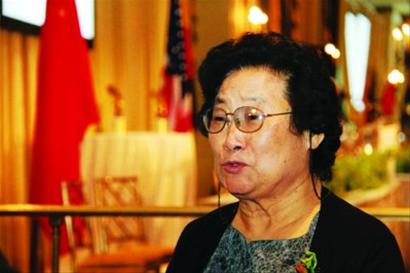(单词翻译:单击)
The Nobel Prize in Physiology or Medicine won by pharmacist Tu Youyou will help boost the development of traditional Chinese medicines, according to a senior health official.
卫生部一位高级官员表示,药剂师屠呦呦获得诺贝尔生理或医学奖有助于推动中医药进一步发展。
Tu, from the China Academy of Chinese Medical Sciences, was due to receive the award on Thursday in Stockholm, Sweden, for her discovery of artemisinin, a TCM that can cure malaria.
来自中国医药科学院的屠呦呦, 因其发现青蒿素,一种可以治疗疟疾的中药,周四在瑞典的斯德哥尔摩,被授予诺贝尔奖。
Her success has led to a promising approach to the modernization and development of TCM through science and technology, said Cao Hongxin, the science and technology chief of the State Administration of Traditional Chinese Medicine.
曹洪欣,传统中医药国家管理局科学技术主管,她的成功使通过科学和技术发展中医药及使其现代化变得前景一片光明。

Cao used to be head of the academy.
曹过去曾是学院主任。
Using a pioneering low-temperature method, Tu and her team-first extracted artemisinin from a sweet wormwood plant more than 40 years ago. Their efforts have saved tens of thousands of lives each year.
屠和她的团队使用一个开创性的低温方法,首先从已有40多年的青蒿植物中提取出青蒿素。他们的努力使得每年成千上万人的生命得以拯救。
Cao said Tu was inspired by many ancient classic works on TCM touting sweet wormwood as a candidate for the development of an antimalarial drug.
曹说屠的灵感来自古老的经典中医学,其吹捧将青蒿作为抗疟药发展的备选药材。
Her success demonstrates that "TCM... has to embrace modern technologies and laboratory tools and, more important, stick to the essence of the time-honored medical science", he said.
她的成功证明了“中医药…包含了现代技术和实验室设备,更重要的是,保留了了历史悠久的医药科学的精髓”他说。
A simple application of Western medical standards to TCM won’t work, he said, calling for more research and standards for TCM.
他说,“对中医药而言,西方医学标准的简单应用将不起作用,”他呼吁对中医药更多的研究和标准。
He cited as an example that the international standards for acupuncture needles and the use of ginseng have been set by China.
他引用了一个例子,即中国针灸针和人参的使用的国际标准。
Cao said Tu’s Nobel Prize will prompt more basic scientific research into ancient TCM texts and ways to explore research findings.
曹教授说,诺贝尔奖将推动更多的基础科学研究走进古代中医文献以及探索研究发现的方法之中。
China spends more than 1 billion yuan ($156 million) annually on TCM-related research, and "that investment will be further strengthened", Cao said.
曹说,中国每年在中医药相关的研究上花费超过10亿元(1.56亿美元),“这一投资将进一步加强”。
Deepened research with the help of modern technology will lead to the modernization of TCM, he said.
“在现代技术的帮助下深化研究,将导致中医药现代化。”他说。
But he added that much remains to be done, particularly practicing innovation when using TCM theories, studying old TCM texts and transforming or commercializing research findings.
但他补充说,仍有许多工作要做,特别是使用中医理论时的实践创新,学习老中医文献以及研究成果的转型或商业化。
He said this work will be listed in China’s 13th Five-Year Plan (2016-20) for TCM, and his administration is working on it.
他说,这项工作被列在中国中医第十三个五年计划清单上(2016-20),他的职责便是致力于这件事。
In five years, the use of TCM will be further explored in the rehabilitation, prevention and treatment of HIV/AIDS, chronic liver infections and diabetes, he said.
他说,在五年内,中医药的应用将进一步探讨艾滋病毒/艾滋病、慢性肝病和糖尿病的康复、预防和治疗问题。


